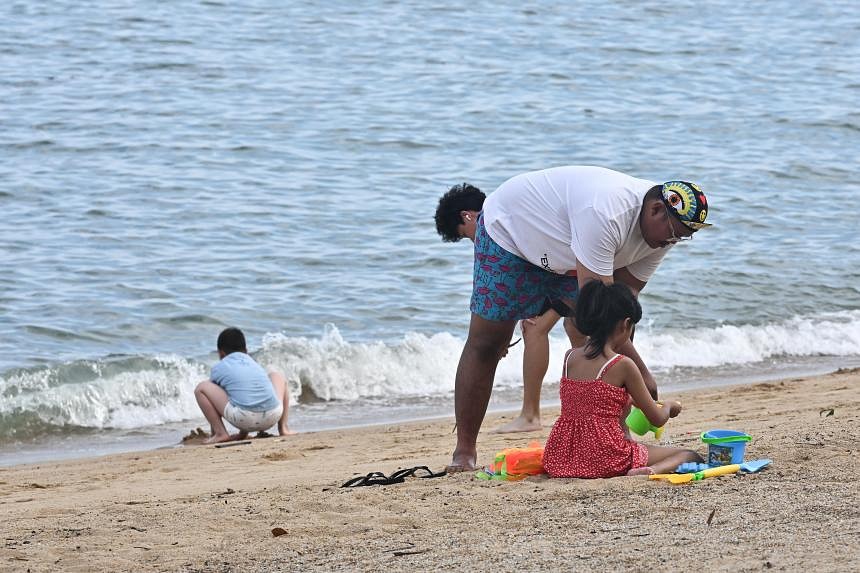Some enter sea at East Coast Park despite advisories after oil spill; doctors warn of health risks

People enjoying beach activities within a taped-off area near Marine Cove in East Coast Park on July 4, 2024.
ST PHOTO: LIM YAOHUI
Elise Wong
JUL 06, 2024
SINGAPORE – Nearly three weeks after a maritime accident at Pasir Panjang Terminal on June 14 resulted in oil washing ashore in East Coast Park, Mr Muhammad Norisham returned to his hobby of skimboarding at the park.
Skimboarding involves using a small surfboard to glide across the water’s surface, meeting an incoming wave, and riding it back to shore.
Despite cordon tapes and advisories urging the public to avoid the waters as the cleanup continues, the 39-year-old was undeterred.
Mr Norisham, a mechanical technician, decided to skimboard on July 3, after finding that the beach looked clean the previous day.
An hour after entering the water, he said he was advised by National Parks Board (NParks) officers patrolling the area to refrain from such activities.
Mr Norisham was among those who had gone into the sea at East Coast Park on the evening of July 3, against the advice of the authorities.
Doctors interviewed by The Straits Times warned that exposure to low-sulphur oil can pose serious health risks.
Respiratory physician Steve Yang from Mount Elizabeth Hospital cautioned that prolonged inhalation of oil fumes can cause wheezing, headaches and light-headedness.
“If exposed, individuals should remove contaminated clothing and wash the affected body parts with water, then soap and water,” he said.
Dr Derek Lim, an associate consultant at the National Skin Centre, warned that exposure to low-sulphur oil can cause skin and eye irritation, respiratory issues, and in extreme cases, carcinogenic effects.
“Those at extremes of age, such as very young children and the elderly, have impaired skin barrier function, and as such, are more susceptible,” Dr Lim said.
The Straits Times saw at least 15 people in the sea near Area C of East Coast Park from 5.30pm to 8pm.
Chinese tourist Cecilia Wong, 40, and her 8-year-old daughter and 5-year-old niece, initially planned to visit Sentosa but were redirected to East Coast Park by a taxi driver after learning of Sentosa’s restriction on sea activities.
In East Coast Park, she watched over her daughter and niece as they dug holes in the sand and waded in the water. She said she thought it was fine for the children to play, as she saw many people along the coast.
Advisories published on government websites advise the public against swimming and primary contact water activities at beaches in East Coast Park and on Sentosa, as well as in the waters off the Southern Islands, “until further notice”.
ST understands that as part of regular patrols, officers from NParks will advise the public to stay away from the closed areas of East Coast Park. The Sentosa Development Corporation also has patrol officers keeping an eye on its beaches.

Workers cleaning up the beach in East Coast Park on June 20, 2024, after an oil spill occurred some days earlier. ST PHOTO: KEVIN LIM
During a visit to Siloso Beach on July 5, ST noticed officers stationed at various points along the beach, with the waterfront cordoned off and signs warning against entry posted.
Only a few visitors were seen near its beaches, and no one attempted to enter the water.
East Coast Park, Sentosa, Labrador Nature Reserve and the Southern Islands were among the areas affected by an oil spill after a Netherlands-flagged dredging boat purportedly lost engine and steering controls on June 14, hitting a Singapore-flagged bunker vessel berthed at Pasir Panjang Terminal. The incident caused 400 tonnes of low-sulphur fuel to leak from the bunker vessel.
Associate Professor Yann Felix Boucher, principal fellow at the Singapore Centre for Environmental Life Sciences Engineering, said studies are under way to understand the status of oil-affected waters around both Pasir Panjang Terminal and the Sisters’ Islands.
“Even if you cannot see the oil in the water, there might still be a significant amount in the sand, where the oil breaks down much more slowly,” he said.
MORE ON THIS TOPIC
During a visit to Siloso Beach on July 5, ST noticed officers stationed at various points along the beach, with the waterfront cordoned off and signs warning against entry posted.
Only a few visitors were seen near its beaches, and no one attempted to enter the water.
East Coast Park, Sentosa, Labrador Nature Reserve and the Southern Islands were among the areas affected by an oil spill after a Netherlands-flagged dredging boat purportedly lost engine and steering controls on June 14, hitting a Singapore-flagged bunker vessel berthed at Pasir Panjang Terminal. The incident caused 400 tonnes of low-sulphur fuel to leak from the bunker vessel.
Associate Professor Yann Felix Boucher, principal fellow at the Singapore Centre for Environmental Life Sciences Engineering, said studies are under way to understand the status of oil-affected waters around both Pasir Panjang Terminal and the Sisters’ Islands.
“Even if you cannot see the oil in the water, there might still be a significant amount in the sand, where the oil breaks down much more slowly,” he said.
No comments:
Post a Comment